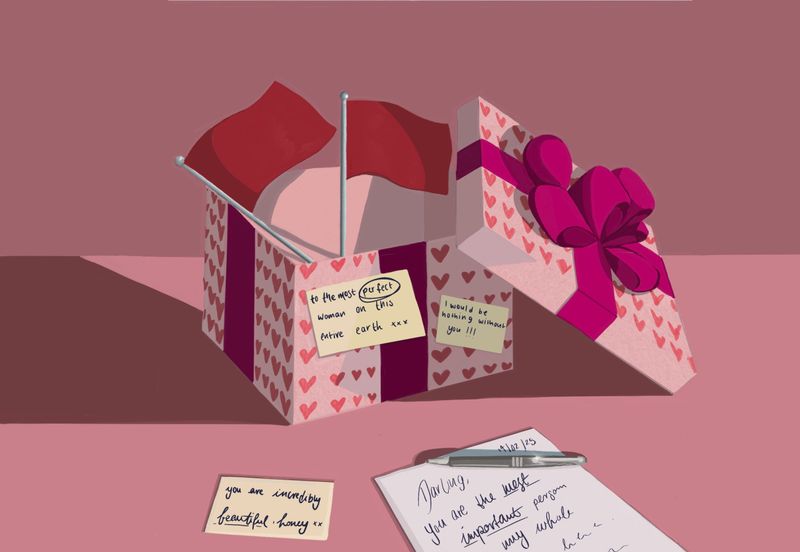16 Kind Relationship Behaviors That Are Major Red Flags in Disguise
Because not all sweetness is sincere — and not every “kind” act is healthy. Some behaviors look thoughtful, affectionate, or generous at first… but over time, they reveal control, insecurity, or emotional manipulation hiding beneath the surface.
They’re not obviously abusive — which is why they’re easy to miss. It’s like putting on rose-colored glasses and missing the messy stuff hiding in plain sight. I’ve seen so many situations where “sweet” gestures are actually ways to keep tabs, create guilt, or quietly take control.
If you’ve ever felt a twinge of discomfort about a partner’s “thoughtful” habit, you’re not crazy. There’s real power in trusting yourself and paying attention to those little alarms—no matter how pretty the package. So, let’s get real about what’s kind… and what’s crossing the line.
1. Constant texting “just to check in”

You know that friend who says, “Text me when you get home!” and it feels sweet? Now, imagine your partner sends message after message all day, every day – and gets upset if you don’t reply immediately.
At first, you might feel special or wanted. But when the check-ins turn into a digital leash, it starts to feel less like care and more like a way to keep you on a short rope. Suddenly, you’re explaining where you are and who you’re with, just to keep the peace.
If your phone starts to feel like a tracking device instead of a way to connect, pause for a second. Real love doesn’t need to know every move you make or guilt-trip you when you need space. That’s not closeness; that’s control dressed up as concern.
2. Always insisting on paying for everything

Big spender vibes can seem romantic, right? A partner who always grabs the bill might seem generous, but if you start feeling awkward saying no, it’s time to check the bill for hidden fees—like guilt or obligation.
When someone insists on paying every single time, it can tiptoe from sweet to suffocating. You might notice they mention their generosity later or expect special treatment in return. Instead of feeling cared for, you might find yourself keeping score or wrestling with silent debts.
Money shouldn’t be a power play. If “treating you” means you owe them, or if it chips away at your independence, that’s not generosity—it’s manipulation in a fancy outfit. Watch for strings attached to those pricey gestures.
3. “I just love you so much, I can’t help being jealous”

Ever had someone say their jealousy is proof of their love? It sounds flattering, maybe even a little dramatic, but here’s the truth: genuine affection doesn’t need to police your every move.
When someone blames their possessiveness on “loving you too much,” it isn’t romantic—it’s a warning sign. This can lead to constant questions, accusations, and maybe even rules about who you can see or talk to.
A partner who trusts you won’t make you justify innocent friendships or harmless fun. If love starts to feel like you’re in a courtroom, being grilled for crimes you didn’t commit, that’s not passion—that’s insecurity with a pretty bow. Don’t mistake obsession for devotion.
4. Wanting to spend every second together

At first, it’s nice to be someone’s favorite person—the one they want to binge-watch, brunch, and do everything with. But when every plan includes them and solo time gets sidelined, it’s a problem hiding under the blanket.
If your partner gets pouty when you make plans without them or doesn’t encourage you to keep your own hobbies, take notice. Healthy couples don’t have to be attached at the hip, and needing alone time isn’t a crime.
True love leaves room to miss each other. When you can’t breathe without checking in, that “clinginess” might just be code for emotional dependence. Relationships grow stronger with a little space.
5. Giving extravagant gifts too soon

There’s a thrill in grand gestures, especially early on. Who doesn’t like a little sparkle? But when a new partner showers you with pricey gifts right out of the gate, you might want to put the brakes on before you’re swept away.
It’s called love-bombing, and it’s a way to lock down your affection fast—before real trust can grow. You could find yourself feeling obligated or thinking, “Wow, maybe this is too good to be true.”
If gifts feel less like celebration and more like pressure, trust your gut. Generosity is sweet, but when it’s used to fast-forward intimacy, it’s time to pause. Real commitment can’t be bought in a box with a bow.
6. “You don’t need anyone but me”

It’s a classic movie line, but real life isn’t a romance script. Hearing “You don’t need anyone but me” might make your heart skip, but it’s actually a red light disguised as a love note.
If your partner paints everyone else as unnecessary or untrustworthy, they’re not just committed—they’re cutting you off. You start to notice you’re seeing less of your friends, and family gatherings become rare.
Isolation isn’t love—it’s control. Healthy couples have their own support systems outside of the relationship. When you begin losing those connections, it’s time to question who’s really benefiting from your world getting smaller.
7. Pushing you to “open up” before you’re ready

There’s nothing wrong with sharing your feelings, but when someone urges you to spill your deepest secrets before you’re ready, hit pause. Trust is built slowly, not under pressure.
A partner who pushes for instant vulnerability might make you feel guilty for keeping boundaries. Maybe they say, “Real couples don’t have secrets,” or hint that you’re not being honest enough. Suddenly, you’re sharing things you’re not comfortable with just to keep the peace.
Remember, your story is yours to tell, on your timeline. If “openness” feels forced or makes you uneasy, you’re not being difficult—you’re protecting your heart. Healthy love waits for your “yes.”
8. Complimenting you all the time

We all love a good confidence boost. But when your partner’s compliments come non-stop, especially if they always focus on your looks, it can start to feel less like appreciation and more like a smoke screen.
Sometimes, it’s an attempt to win you over or ease their own insecurities. Other times, it’s to distract you from noticing other problems—or to make you depend on their approval. A compliment should lift you, not leave you wondering what’s real.
Genuine praise feels balanced and thoughtful. If it’s constant, flashy, or always about surface stuff, you might be in the middle of a charm offensive, not a healthy connection. Don’t let sweet talk drown out your inner voice.
9. “Protecting” you from others they don’t like

It starts with, “I just worry about you,” and suddenly your partner is side-eyeing your friends, questioning their motives, or suggesting you stay away from certain people. What looks like protection can really be isolation.
If they keep pointing out “red flags” in everyone else but themselves, ask yourself who you’re being protected from—and why. Over time, you might feel anxious about inviting friends over or sharing details about your social life.
True protection is about supporting your choices, not policing your circle. If you’re being steered away from people you care about, that’s not love—it’s a subtle way to shrink your world.
10. Apologizing instantly, but doing the same thing again

We all mess up and need to say sorry, but the real apology is change. If your partner is quick to say, “I’m sorry,” but the pattern never shifts, it’s not growth—it’s just a shortcut to avoid real accountability.
You might notice they apologize before you even finish expressing your feelings. Next time, the same thing happens. It feels like hitting the reset button, but you’re still stuck in the same game.
An apology without effort is just a rehearsal. If you find yourself hearing “It won’t happen again” on repeat, it’s time to ask what’s really being fixed—your feelings, or their comfort?
11. Always agreeing with you — even when they don’t mean it

At first, having a partner who always agrees feels like a dream. There’s no drama, no arguments—just endless yeses. But if you catch them second-guessing themselves or echoing your opinions too much, it’s time to wonder why.
Sometimes, people agree to keep the peace or avoid conflict. Other times, they’re trying to become your “perfect match,” hoping you’ll never leave. The problem is, it’s not real connection if one person disappears to make things easy.
You deserve honesty, not a chameleon. Real intimacy means sharing differences, not hiding them. If your partner never pushes back, you might be connecting with an act instead of a real person.
12. Always wanting to talk about your relationship

Some relationship check-ins are healthy, but if it feels like you’re stuck in a never-ending status meeting, take a breath. When every conversation circles back to your relationship, it’s exhausting, not endearing.
You may notice your partner always wants to “talk things out”—even about tiny things. Suddenly, your phone buzzes with texts about the relationship when you’re just trying to enjoy your day. Instead of feeling secure, you end up anxious, always wondering what’s wrong now.
Communication is good, but constant “processing” can actually be a way to stir up worry or keep you emotionally on the hook. Make sure your relationship leaves space for actual living.
13. Sharing your secrets or vulnerabilities “as a joke”

There’s a difference between inside jokes and airing your private business for laughs. If your partner likes to share your sensitive stuff “just for fun,” it’s not harmless—it’s humiliating.
You might laugh along to keep it light, but deep down, it stings. When someone tells your secrets—even with a joking tone—they’re showing you how little they value your trust. Over time, it chips away at your sense of safety and respect.
Trust should be protected, not turned into punchlines. If you’re being used for entertainment, or if your boundaries are brushed off for laughs, it’s time to check who’s really laughing.
14. Helping with your problems — but making you feel incapable without them

Support is a beautiful thing, but it’s not helpful if it’s wrapped in “let me do everything because you can’t.” If your partner takes over your problems and then acts like you’d be lost without them, it’s not loving—it’s patronizing.
You might start second-guessing your own abilities or feeling weirdly grateful for things you could do yourself. Instead of empowerment, you get a steady drip of self-doubt. It’s a quiet way of keeping you dependent.
Healthy relationships lift you up, not keep you in the passenger seat. If “help” leaves you feeling small, it’s time to reclaim your confidence and set new boundaries.
15. Pushing commitment fast “because they’ve never felt this way before”

When someone says, “I’ve never felt this way before—let’s make it official,” it sounds like a fairy tale. But fast-forwarding commitment before you’ve had a chance to build trust can be a recipe for regret.
You might feel pressured to match their speed or worry that slowing down means you don’t care. Suddenly, plans for the future are everywhere, but you haven’t even learned each other’s quirks yet.
Real love grows over time. If you feel like you’re being pushed onto a fast track, slow down and check whose timeline you’re on. Rush is not romance—it’s usually a sign of control or insecurity.
16. Making themselves the victim in every situation

Ever notice how some people can flip any argument and somehow make it all about their pain? When your partner turns every issue into a pity party for themselves, it’s not empathy—it’s emotional bait and switch.
You might try to express your feelings, but suddenly you’re the one doing the comforting. It’s exhausting and leaves your needs in the dust. The relationship becomes a cycle where your pain is always second place to theirs.
True partnership means both people get space to be heard and heal. If you’re always cast as the villain, or if your partner’s tears erase your truth, that’s not connection—it’s a spotlight hogging act.







